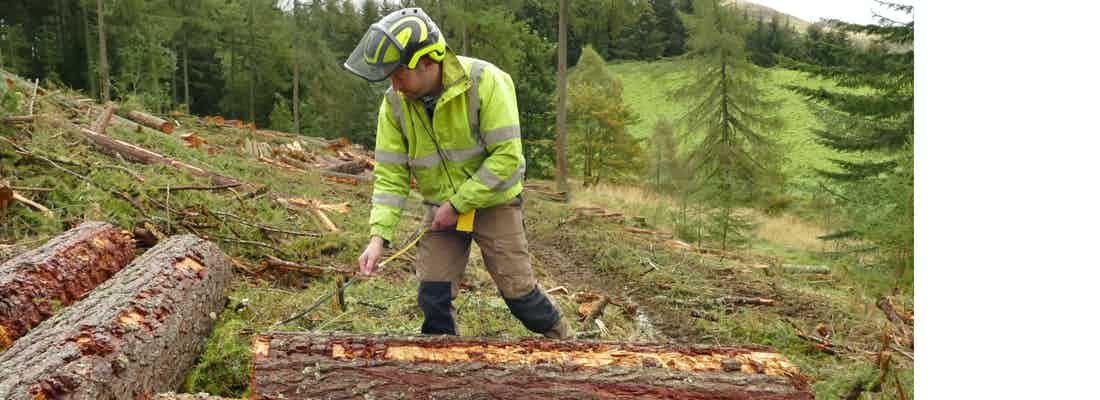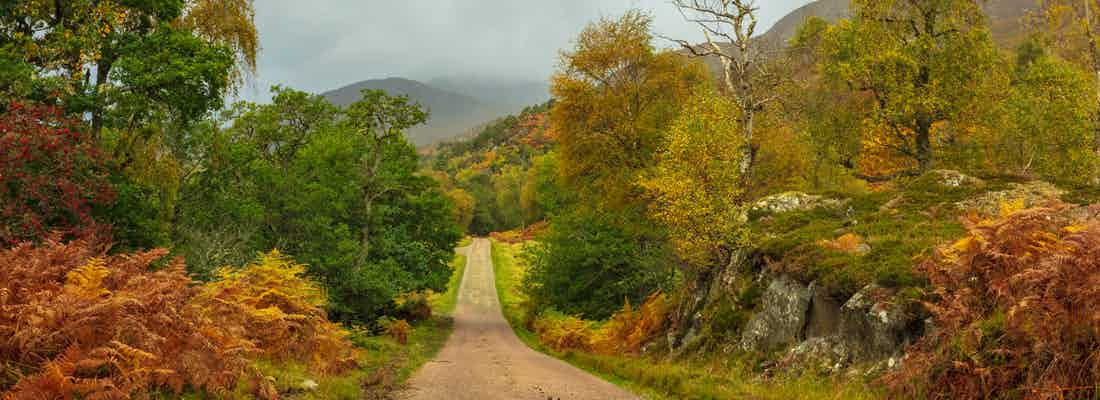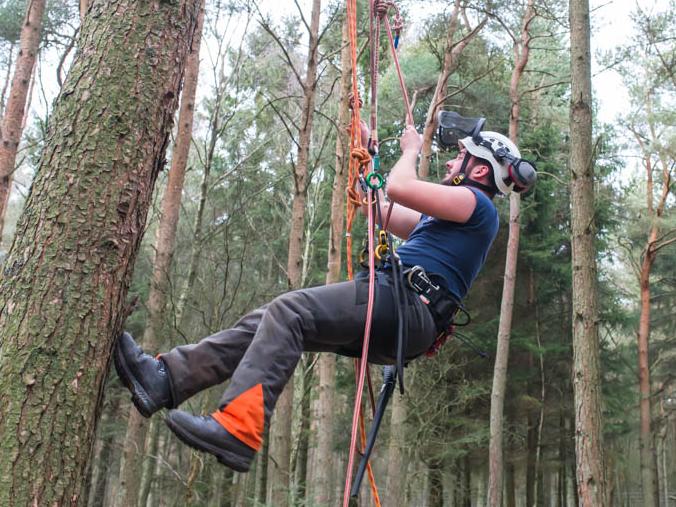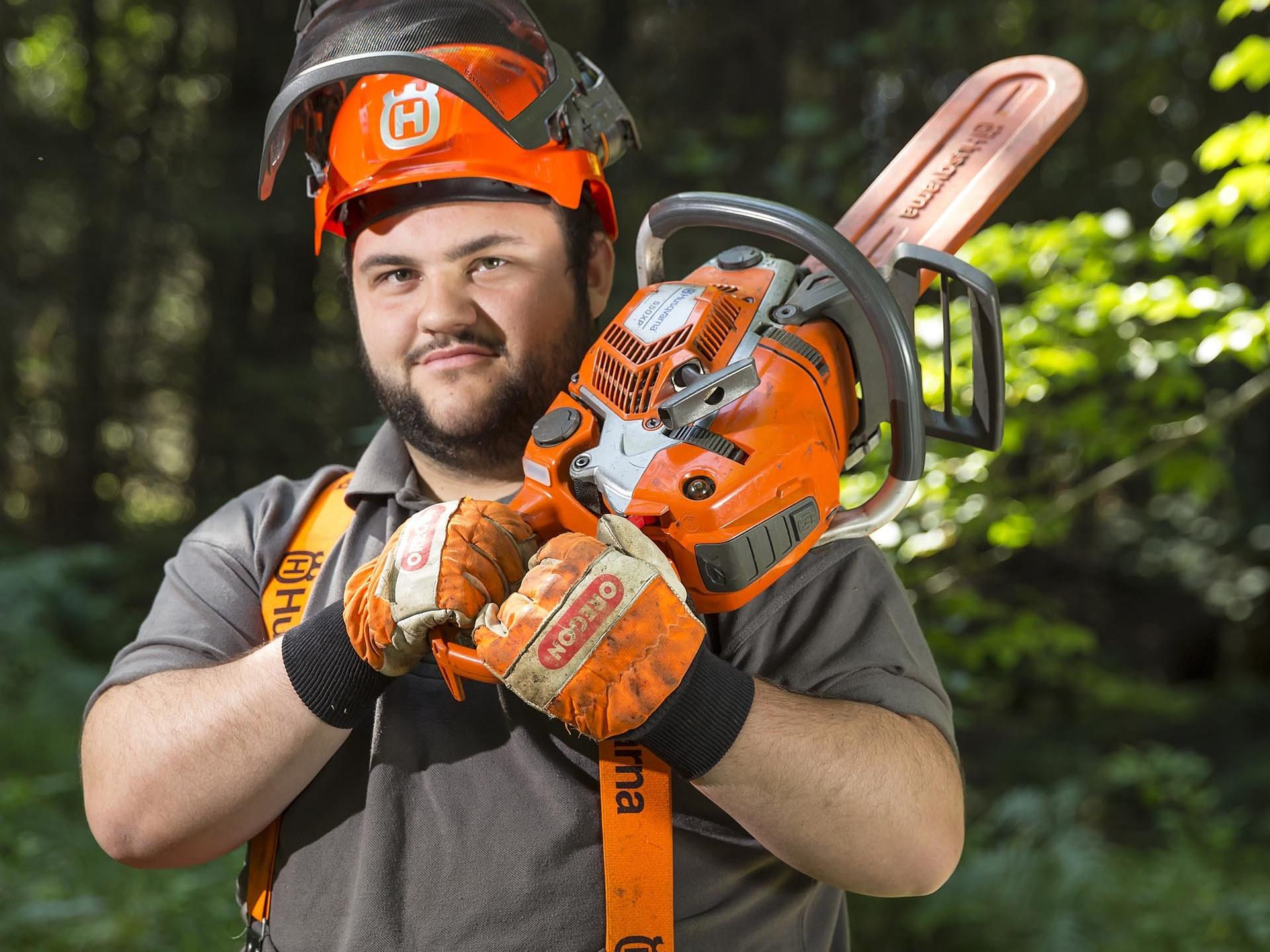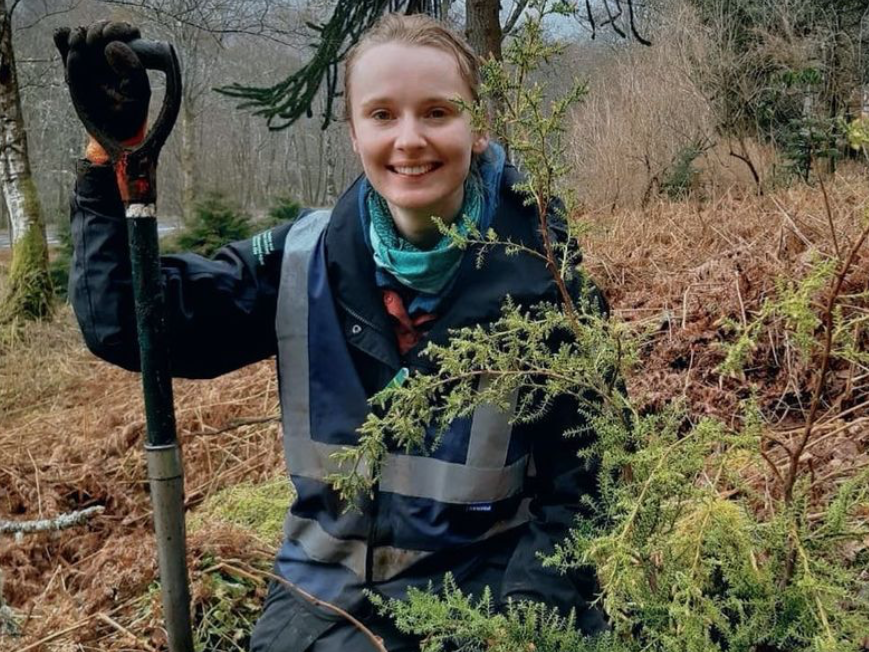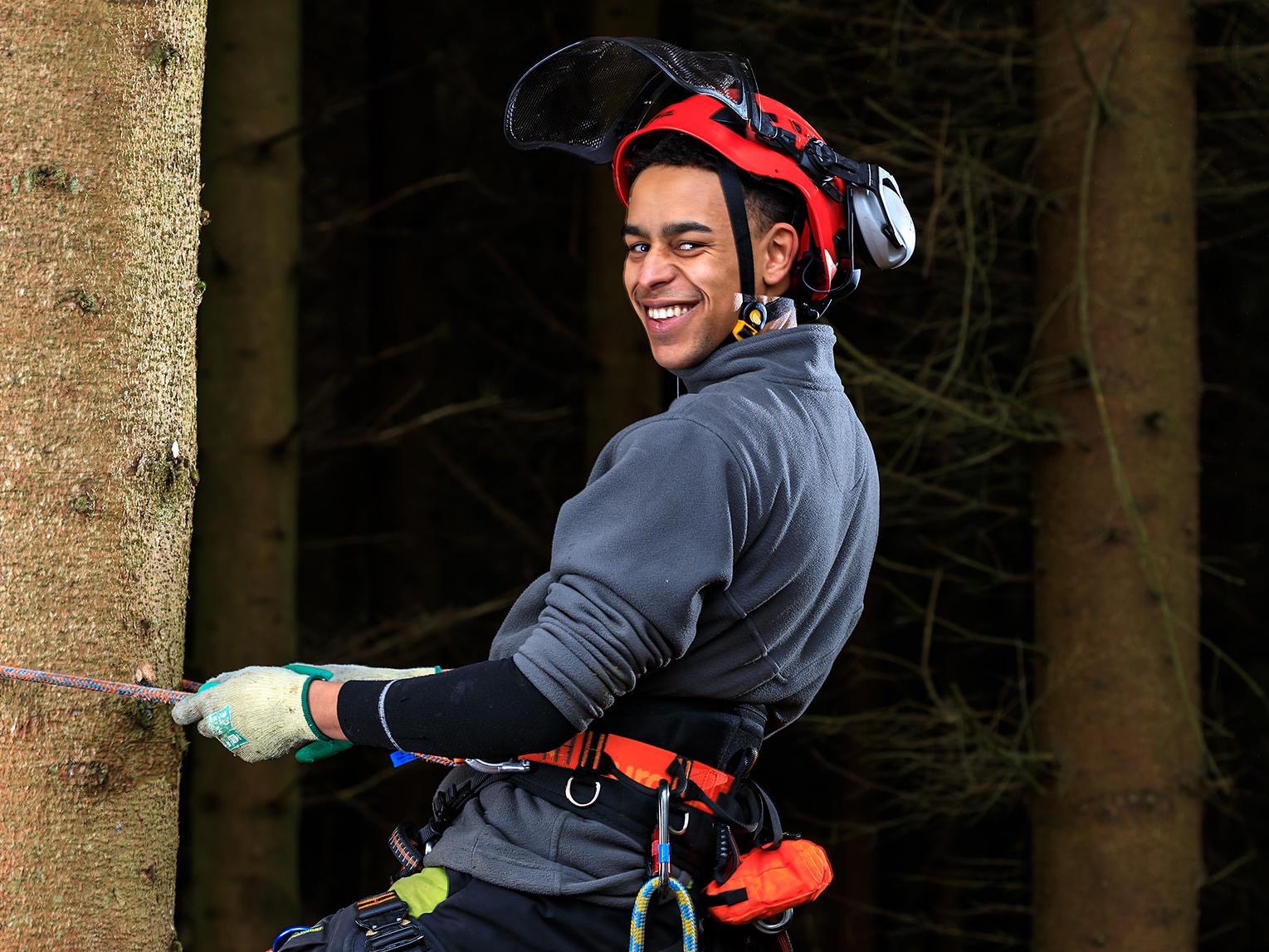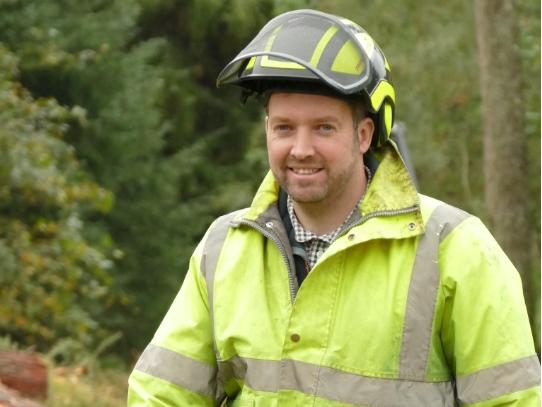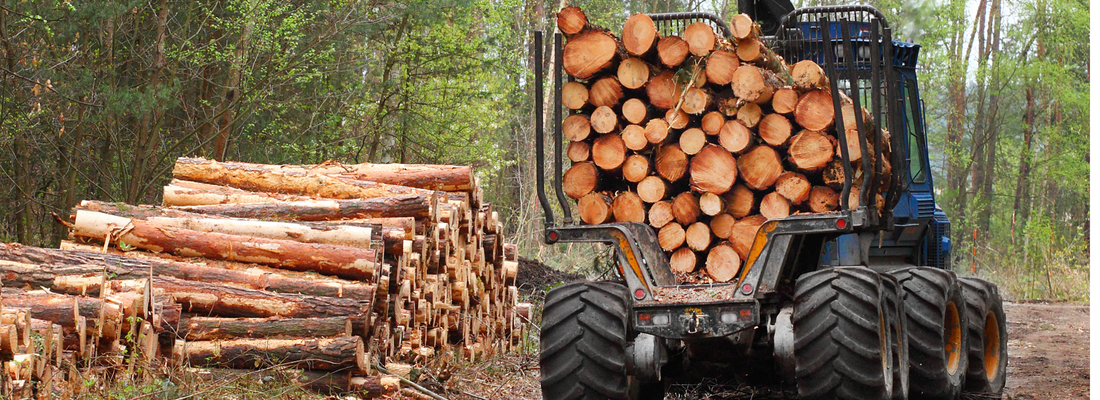
There are lots of jobs available in trees and timber across Scotland, with many different skills needed.
If you're interested in managing or improving forests as part of a sustainable Scotland, a career in trees and timber could give you a challenging and rewarding life.
Whether you like being outdoors using machinery and getting your hands dirty, or prefer science or research within a lab, look no further.
There's always a need for new people into the industry across different career options, including science and research, hands-on in the field working with the latest in harvesting technology or using your communication skills in education or consultancy.
The public and private sectors always need new staff, so have a look at the examples of jobs below to get some ideas.
If you want a less serious look at careers in trees and timber, here's a video we did with stand-up comedian and farmer, Jim Smith.
NPTC Tree Surgery (comparable to SCQF L6)
SVQ Trees and Timber SCQF Level 5
Forestry Certificate SCQF Level 5
Modern Apprenticeship in Trees and Timber SCQF Level 6
Modern Apprenticeship in Trees and Timber SCQF Level 5
Social Forester
Social Foresters are involved in using trees and woodlands to deliver social benefits to all groups within society. Social Foresters work with groups of people to promote improved well-being and mental health. A Social Forester needs to have a range of practical forestry work skills and also be good at working with diverse groups of people.
Social Foresters will work to organise events, activities and projects to increase social involvement and interaction within woodlands. These activities may include working with schools, social groups and individuals on tree planting schemes, the production of wood products, such as hurdles and timber shingles, and assisting with educational activities.
A major part of social forestry is an understanding of the physical, emotional and psychological benefits that woodlands have on people. Social Foresters may work with individuals or groups on woodland activities that are educational or therapeutic.
Managerial work undertaken can involve the development of a business plan, marketing and control of budgets, preparing applications for funding or assessing planning applications. Managers may also be involved in the recruitment and supervision of staff and volunteers.
Working Conditions
Work can be physically demanding and Social Foresters need to be prepared to work outdoors in all weathers.
Social Foresters typically work full-time. However, the hours may vary and weekend or Bank Holiday work can be required.
Depending on the area covered, there may be a significant amount of travelling between different sites. A driving licence may be required.
Salary
Salaries vary with experience, qualifications and between companies, but here's a guide to what you can expect.
£19,000
£27,000
Getting started
Many people who come to work within Social Forestry will have had some experience working in a related area, such as arboriculture, forestry or environmental science.
Interest in Social Forestry has increased and there are projects running in many of the larger towns and cities across Britain. Jobs may be found within local government and charitable trusts, such as the Woodland Trust.
Employers are looking for people who:
Enjoy working outside
- Enjoy practical/physical work
- Are interested in the environment.
What experienced workers can do
- Communicate information and knowledge
- Prepare learning and development programme
- Deliver interpretive activities
- Produce interpretive media
- Identify learning and development needs
- Consult and work with local communities
- Manage planted areas
- Investigate community and social forestry opportunities and activities
- Fell trees
- Plant trees.
Personal qualities you should have
- Working with others
- Communication
- Safety awareness
- Accepting social values
- Input into community projects or fundraising events
- Developing enterprise
- Self-motivated
- Flexible
- Energetic.
Next steps
It may be possible to progress to higher grades within similar roles, taking on greater supervisory responsibility. However, this will vary depending upon the nature of the employer.
Progression beyond the role will tend to be into a more managerial role, which will involve less hands-on practical work.
Useful links
Head Forester
Head Foresters can have progressed to this more managerial position from a working role in the woodland. In addition to being responsible for the management of Forestry Workers, they will also undertake the planning of planting and harvesting activities and the monitoring and management of planted areas.
The role may also include significant conservation work, such as creating and restoring native woodlands. The type of practical work carried out on site will vary depending upon the nature of their employer, the type and location of the woodlands being managed. Working in private woodland or for Forestry Commission Scotland will often require a wider range of skills and knowledge, including land management skills.
A Head Forester will also usually have to control a budget and follow a business plan developed for the sites they manage. Some Head Foresters may manage several forests with Assistant Head Foresters looking after the teams at each location. Their main tasks may include planning the work to be carried out by staff and contractors, managing the maintenance of machinery and equipment, maintaining records of work and ensuring that health and safety policies are observed. They will also be required to survey and inspect trees and sites, selecting and marking up timber to be harvested as well as planning, monitoring and evaluating habitat management work.
A Head Forester will have an excellent understanding of sustainable forestry and be able to achieve high standards of environmental quality, protection and conservation.
Working Conditions
Forest and woodland managers need a range of technical and professional skills. They will work indoors and outdoors in a range of weather conditions, and it can be physically demanding.
Head Foresters typically work full-time with some spent in the office. However, the hours may vary and weekend or Bank Holiday work can be required.
Depending on the area covered, there may be a significant amount of travelling between different sites. A driving licence may be required.
Salary
Salaries vary with experience, qualifications and between companies, but here's a guide to what you can expect.
£25,000
£35,000
Getting started
Forestry Commission Scotland, forest management companies, forestry contracting companies, private estates, local authorities, conservation organisations and charities employ head foresters. Most jobs are found in rural locations with large forested areas.
Employers are looking for people who:
Enjoy working outside
- Enjoy practical/physical work
- Are interested in the environment.
What experienced workers can do
- Measure, record and forecast volume of timber
- Survey trees
- Manage harvesting operations
- Identify the need for, and plan, habitat and ecosystem management work
- Assess forest and woodland yields
- Monitor the work of your staff
- Plan and design a woodland
- Manage specimen trees
- Provide financial forecasts
- Compile and maintain the forest and woodland inventory
- Work to forest certification standards and regulations.
Personal qualities you should have
- Responsibility
- Initiative
- Flexibility
- Energetic and enthusiastic
- Good with people.
Next steps
Many foresters aim to complete the requirements for Chartered Forester or Arboriculturist status from the Institute of Chartered Foresters. This brings a high level of professional recognition within the sector.
Useful links
Harvesting Manager
Forestry Harvesting Managers deal with the felling of trees and their preparation for transport and processing. They are responsible for the selection of suitable timber and planning of harvesting activities.
Working in private woodland or for Forestry Commission Scotland, they often need a wide range of skills and knowledge, including land management skills. The Harvesting Manager will usually have to control a budget and follow a business plan developed for the sites they manage.
They may be answerable to the Head Forester, or land agent, who oversees the forestry work in different locations.
A Forestry Harvesting Manager’s main responsibility is planning harvesting work to be carried out by staff and contractors.
They may be required to survey and inspect trees and sites, selecting and marking up timber to be harvested, plan harvesting activities and manage output of felled timber against set income targets.
Working Conditions
Although a Harvesting Manager is a management role, it can be physically demanding. Some of the time will be spent office-based but you should still be fit and able to work outdoors in all weathers.
Harvesting Managers typically work a standard full-time week. However, the hours may vary and weekend or Bank Holiday work can be required.
Depending on the area covered, there may be a significant amount of travelling between different sites. A driving license may be required.
Salary
Salaries vary with experience, qualifications and between companies, but here's a guide to what you can expect.
£25,000
£30,000
Getting started
While the largest employer is Forestry Commission Scotland, private estates, local authorities, conservation organisations and charities, government agencies and forest management companies also employ Forest Workers. Most jobs are found in rural locations with large forested areas.
Employers are looking for people who:
- Enjoy working outside
- Enjoy practical/physical work
- Are interested in the environment.
What experienced workers can do
- Business management
- Work site safety and hazard recognition
- Risk Assessment
- Equipment use and maintenance
- Machinery use and safety.
Personal qualities you should have
- Good communication skills (written and verbal)
- Be able to plan and manage work have good organisational skills
- Be practical and good at working with their hands
- Be able to work safely
- Be responsible, diligent and self-motivated
- Enjoy working as part of a team but also confident working independently
- Have good communication skills
- Be able to plan and manage workloads
- Be able to deal confidently and tactfully with others on a one-to-one or group basis
- Responsible and aware of health and safety issues
- Resourceful and mechanically minded.
Next steps
As a Harvesting Manager, progression will depend upon the type of organisation that you work for.
Harvesting Managers may become forestry consultants or move into a contracting role.
Useful links
Forestry Worker
A Forestry Worker, also known as a Forest Craftsperson in Forestry Commission Scotland, cares for and manages woodland areas and forests. They are involved in tree establishment, protection, maintenance and timber production and also play an important part in protecting ecological and animal habitats, and enhancing the future landscape.
Duties usually involve:
- Conducting forest surveys and assessing tree volumes and density
- Carrying out tree safety inspections, marking and measuring trees to be cut down for timber production
- Doing general groundwork to clear sites and undergrowth
- Planting new trees
- Digging or installing more efficient drainage systems
- Controlling unwanted vegetation
- Cutting back shrubs and other ground cover to promote the healthy growth of young trees
- Brashing and pruning to promote healthy growth in older trees
- Using specialist tools to thin out dense wooded areas and fell trees to improve access for operations and recreation
- Harvesting trees, removing branches and cutting felled tree trunks into specific lengths
- Identifying and protecting the forest against pests, diseases and disorders, particularly on young trees
- Clearing footpaths and nature trails, and maintaining adjoining car parks and public areas.
To maintain recreational sites and enhance woodland areas for public use, Forestry Workers may be required to erect fences and gates, and install footpath signs and public information notices.
Forestry Workers may also assist in the tackling of forest fires. They are often responsible for checking and maintaining basic fire-fighting equipment located near wooded areas.
Some Forestry Workers may work with contractors specialising in one specific aspect of the work, such as harvesting or establishing and protecting new trees.
Working Conditions
Forestry workers typically work 37 hours a week, Monday to Friday, although some overtime and weekend work may be necessary. Part-time and casual work is possible. Work can be seasonal and longer days may be necessary during peak times.
Forestry workers spend nearly all of their time working outdoors, in all weather conditions. The work can be physically challenging, with lots of lifting, climbing and walking through densely wooded areas.
A driving licence may be required.
Salary
Salaries vary with experience, qualifications and between companies, but here's a guide to what you can expect.
£12,000
£18,000
Getting started
While there is strong competition for jobs, demand for new entrants is constant. Around 50% of forestry workers are self-employed. They are normally hired for specific contracts, such as planting or felling trees. Contracts are often short term, typically lasting about three months.
Employers are looking for people who:
- Enjoy working outside
- Enjoy practical/physical work
- Are interested in the environment.
What experienced workers can do
- Maintain equipment and machines
- Tree identification and properties
- Plant trees
- Maintain planted areas
- Control unwanted vegetation by non-chemical and chemical means
- Fell and process trees using a chainsaw
- Cross-cut timber using a chainsaw
- Maintain paths and surfaces
- Construct, maintain and repair boundaries, access points or site furniture
- Identify and report the presence of pests, diseases and disorders.
Personal qualities you should have
- Initiative
- Self confident
- Attention to detail
- Safety aware
- Able to work on your own
- Energetic
- Flexible.
Next steps
Gaining experience and completing training courses in order to become competent in the use of specialist equipment will enable progression to craftsperson status.
Thereafter, promotional prospects can vary depending upon the nature of the employer. With large employers, such as Forestry Commission Scotland, it may be possible to progress to Senior Forest Worker or Works Supervisor.
In smaller organisations you may have to change location or employer to progress.
Many experienced Forestry Workers become self-employed and contract out their services.
With further training and qualifications, it may be possible to advance to Forest Officer level.
